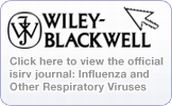News: Novel coronavirus
| General news | Influenza A(H7N9) | Novel coronavirus (MERS-CoV) | ||||
| In light of the evolving situation, you are advised to check the WHO Global Alert and Response web-pages (link below) to obtain the most up-to-date information on MERS-CoV. | |
| World Organisation for Animal Health (OIE) Q&A on MERS CoV | |
| The OIE has published an updated set of Questions and Answers on the MERS Coronavirus. These can be found at: http://www.oie.int/for-the-media/press-releases/detail/article/questions-and-answers-mers-coronavirus-cov/ | |
| Consortium for the Standardization of Influenza Seroepidemiology (CONSISE) | |
| CONSISE is a global partnership aiming to standardize influenza seroepidemiology and develop comprehensive influenza investigation protocols to inform public health policy. For more information about CONSISE, see www.consise.tghn.org. CONSISE has developed epidemiologic protocols for MERS-CoV investigations. These are described at: http://consise.tghn.org/articles/novel-coronavirus-ncov/ Conclusions of the Fourth CONSISE International Meeting are summarised in a Eurosurveillance article, available here. |
|
 |
World Health Organisation literature update (20 September 2013) |
| The World Health Organisation (WHO) has published a summary of of recent cases and a literature update, available at: http://who.int/csr/disease/coronavirus_infections/archive_updates/en/index.html | |
 |
WHO interview questionnaire for investigating cases of MERS-CoV |
| WHO has issued an interview questionnaire to assist in the investigation of suspected and confirmed MERS-CoV infections. The questionnaire is intended mainly for gathering information on routes of exposure to the virus, and includes questions on travel history, exposure to animals, foods and sick persons. The document, which is intended as a supplemental tool to go with investigation guidelines published previously by WHO, is available from the WHO website. |
|
| Clinical management decision support tool | |
| Public Health England (PHE) and the International Severe Acute Respiratory & Emerging Infection Consortium (ISARIC) have published a Clinical Decision Making Tool for the Treatment of MERS-CoV. The tool is available through the PHE website. | |
| Novel coronavirus to be called MERS-CoV (15 May 2013) | |
| To provide uniformity and to facilitate communication about the disease, the Coronavirus subgroup of the International Committee on Taxonomy of Viruses has decided to call the novel coronavirus Middle East respiratory syndrome coronavirus (MERS-CoV). The standardised name was announced in the Journal of Virology. Available at: http://jvi.asm.org/content/early/2013/05/08/JVI.01244-13.abstract | |
| ISARIC (International Severe Acute Respiratory and Emerging Infection Consortium) | |
| ISARIC is a global inititiative aiming to ensure that clinical researchers have the open access to protocols and data-sharing processes needed to facilitate a rapid response to emerging diseases that may turn into epidemics and pandemics. ISARIC and the WHO have published SARI and Natural History Protocols to promote and facilitate research in emerging infections globally, and to move towards standardized data collection for high quality and comparable international results. Available at: http://isaric.tghn.org/articles/isaric-and-who-sari-and-natural-history-protocols/ |
|
 |
World Health Organisation literature update (8 May 2013) |
| The World Health Organisation (WHO) has published a summary of of recent cases and a literature update, available at: http://www.who.int/csr/disease/coronavirus_infections/update_20130508/en/index.html# A previous literature summary is available at: http://www.who.int/csr/disease/coronavirus_infections/update_20130424/en/index.html |
|
 |
World Health Organisation information on MERS-CoV |
| The World Health Organisation (WHO) Global Alert and Response (GAR) web pages provide the latest updates on the number of cases of MERS-CoV infection, as well as technical laboratory and surveillance guidance. Available at: http://www.who.int/csr/disease/coronavirus_infections/en/index.html | |
 |
European Centre for Disease Prevention and Control (ECDC) information on MERS-CoV |
| The ECDC website provides information and European risk assessments on the novel coronavirus infection. Available at: http://www.ecdc.europa.eu/en/healthtopics/coronavirus-infections/Pages/index.aspx |
|
 |
Public Health England (PHE) information on MERS-CoV |
| The PHE website provides information on the novel coronavirus infection, including a phylogenetic tree. Available at: http://www.hpa.org.uk/webw/HPAweb&;Page&HPAwebAutoListName/Page/1317136202637 |
|
 |
Centres for Disease Control and Prevention (CDC) information on MERS-CoV |
| The CDC website provides information on MERS-CoV infection. Available at: http://www.cdc.gov/coronavirus/index.html | |
| ProMED information on MERS-CoV | |
| The ProMED website publishes as synthesis of the latest case reports and scientific correspondence on its website, and via email updates: |


